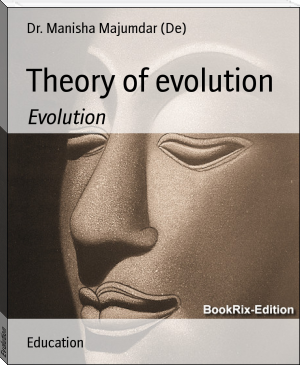Freedom in Science and Teaching by Ernst Haeckel, T. H. Huxley (free ebook reader for pc .TXT) 📖

- Author: Ernst Haeckel, T. H. Huxley
Book online «Freedom in Science and Teaching by Ernst Haeckel, T. H. Huxley (free ebook reader for pc .TXT) 📖». Author Ernst Haeckel, T. H. Huxley
While we cannot but earnestly lament Virchow's inimical attitude in this great struggle for truth, we must not overlook the effects of his well-founded authority in a yet wider sphere. For instance, the hostile attitude which the greater part of the Berlin press persistently maintains towards the doctrine of development (particularly the Liberal "National-Zeitung") is to be referred to the influence of his authority. But much as this reactionary vein, in this and in other intelligent circles at Berlin, must be regretted on the one hand, on the other we must observe that by this evil we have been preserved from a far greater one. This greater evil--the greatest, in fact, which German science could have to encounter--would be the monopoly of knowledge at Berlin; a Centralisation of Science. The injurious fruits of this system of centralisation in France, for instance, the continual deterioration of French science through the Parisian "Monopoly of Knowledge," and its steady decline during half a century from the sublimest heights--these are all well known. From such a centralisation of German science--which would be especially dangerous if it occurred in the capital, Berlin--we may hope to be preserved; in the first place by the manifold differences and the many-sided individuality of the German national spirit, the much-abused German provincialism (Particularismus). While these provincial modes of thought can never have any permanent political value, nor be productive of a desirable form of government, it is beyond a doubt that their outcome has been fruitful and happy for German science. For it owes its splendid pre-eminence over that of other countries precisely to the many centres of culture which were offered by those numerous petty capitals of the minor German States which strove to outdo each other in eager emulation. It is to be hoped that this happy decentralisation of science in our politically united fatherland may continue to subsist!
And next to this centrifugal tendency of our German national mind nothing will so greatly contribute to it as a vigorous opposition to the free advance of science, such as is just now declaring itself in the metropolis. For by just so much as Berlin is dragged back by it in the mighty onward stream of free intellectual movement, by so much will it see itself outstripped by the other seats of culture in Germany, which follow the stream with enthusiasm, or at least without resistance. If Emil du Bois-Reymond raises the cry of "Ignorabimus," and Rudolf Virchow his still more audacious one of "Restringamur," as the watchwords of science, then, from Jena, let the shout be raised and echoed from a hundred other universities--"Impavidi progrediamur!"
ImprintPublication Date: 11-08-2014
All Rights Reserved
 The desire to acquire knowledge about the surrounding world and human society is quite natural and understandable for a person. Life is so developed that an uneducated person will never occupy a high position in any field. Humanity in its mass, and each person individually, develops objectively, regardless of certain life circumstances and obstacles, but with different intensity. The speed of development depends on the quality of training.
The desire to acquire knowledge about the surrounding world and human society is quite natural and understandable for a person. Life is so developed that an uneducated person will never occupy a high position in any field. Humanity in its mass, and each person individually, develops objectively, regardless of certain life circumstances and obstacles, but with different intensity. The speed of development depends on the quality of training.




Comments (0)